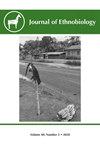在本地市场进行的药用植物民族植物学研究中的抽样偏差
IF 1.3
3区 社会学
Q1 ANTHROPOLOGY
引用次数: 0
摘要
摘要研究发现,在民族生物学研究中存在强烈的抽样偏差,这可能严重影响研究结果。然而,这些研究是在巴西研究的背景下进行的,仍然需要进行全球抽样评价。本研究采用全球范围,并以公开集市和市场上药用植物的民族植物学调查为基础。我们的目的是评估样品质量,并确定干扰它的因素。我们调查的因素包括:(a)发表年份,(b) CiteScore, (c)是否存在明确的研究问题,(d)提出假设,以及(e)民族植物学指数的使用如何影响抽样偏倚的存在。研究中证实的主要偏倚来源是缺乏关于样本和总体的信息。测试的变量中没有一个干扰研究的偏倚水平。需要努力纠正有关抽样程序的定量研究,科学期刊的同行评议活动应注意抽样偏差。本文章由计算机程序翻译,如有差异,请以英文原文为准。
Sampling Bias in Ethnobotanical Studies on Medicinal Plants Conducted in Local Markets
Abstract. Studies have identified the strong presence of sampling bias in ethnobiological research, which may seriously compromise study results. However, these studies were made in the context of Brazilian studies and global sampling evaluations are still needed. The present study adopted a global scale and was based on ethnobotanical surveys of medicinal plants in open fairs and markets. We aimed to assess sample quality and to identify the factors that interfere with it. Among the factors we investigated were how the (a) year of publication, (b) CiteScore, (c) presence of a clear research question, (d) presentation of hypotheses, and (e) the use of ethnobotanical indices influences the presence of sampling bias. The main source of bias verified in the studies was the absence of information about the sample and the population. None of the variables tested interfered with the level of bias of the studies. Efforts are needed to correct quantitative studies regarding sampling procedures, and the peer-review exercise in scientific journals should be attentive to sampling bias.
求助全文
通过发布文献求助,成功后即可免费获取论文全文。
去求助
来源期刊

Journal of Ethnobiology
Social Sciences-Anthropology
CiteScore
4.80
自引率
3.40%
发文量
21
审稿时长
>12 weeks
期刊介绍:
JoE’s readership is as wide and diverse as ethnobiology itself, with readers spanning from both the natural and social sciences. Not surprisingly, a glance at the papers published in the Journal reveals the depth and breadth of topics, extending from studies in archaeology and the origins of agriculture, to folk classification systems, to food composition, plants, birds, mammals, fungi and everything in between.
Research areas published in JoE include but are not limited to neo- and paleo-ethnobiology, zooarchaeology, ethnobotany, ethnozoology, ethnopharmacology, ethnoecology, linguistic ethnobiology, human paleoecology, and many other related fields of study within anthropology and biology, such as taxonomy, conservation biology, ethnography, political ecology, and cognitive and cultural anthropology.
JoE does not limit itself to a single perspective, approach or discipline, but seeks to represent the full spectrum and wide diversity of the field of ethnobiology, including cognitive, symbolic, linguistic, ecological, and economic aspects of human interactions with our living world. Articles that significantly advance ethnobiological theory and/or methodology are particularly welcome, as well as studies bridging across disciplines and knowledge systems. JoE does not publish uncontextualized data such as species lists; appropriate submissions must elaborate on the ethnobiological context of findings.
 求助内容:
求助内容: 应助结果提醒方式:
应助结果提醒方式:


